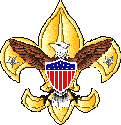| MERIT BADGES |
|
|
|
|
| Note: Eagle Required are in Italics |
"A"
American
Business
American Culture
American Heritage
American Labor
Animal Science
Archaeology
Archery
Architecture
Art
Astronomy
Athletics
Atomic Energy
Auto Mechanics
Aviation
"B"
Backpacking
Basketry
Bird Study
Bugling
"C"
Camping
Canoeing
Chemistry
Cinematography
Citizenship
Community*
Citizenship Nation*
Citizenship World*
Climbing
Coin Collecting
Collections
Communications*
Computers
Cooking
Crime Prevention
Cycling*
"D"
Dentistry
Disability Awareness
Dog Care
Drafting
"E"
Electricity
Electronics
Emergency
Preparedness**
Energy
Engineering
Entrepreneurship
Environmental
Science*
"F"
Family Life*
Farm Mechanics
Fingerprinting
Fire Safety
First Aid*
Fish & Wildlife Mgmt.
Fishing
Fly Fishing
Forestry
"G"
Gardening
Genealogy
Geology
Golf
Graphic Arts
"H"
Hiking
Home Repairs
Horsemanship
"I"
Indian Lore
Insect Studies
"J"
Journalism
"K"
"L"
Landscape Architecture
Law
Leatherwork
Lifesaving**
"M"
Mammal Study
Medicine
Metalwork
Model Design & Building
Motorboating
Music
"N"
Nature
"O"
Oceanography
Orienteering
"P"
Painting
Personal Fitness**
Personal Management*
Pets
Photography
Pioneering
Plant Science
Plumbing
Pottery
Public Health
Public Speaking
Pulp and Paper
"Q"
"R"
Radio
Railroading
Reading
Reptile & Amphibian Study
Rifle Shooting
Rowing
"S"
Safety
Salesmanship
Scholarship
Sculpture
Shotgun Shooting
Skating
Skiing
Small Boat Sailing
Soil & Water
Conservation
Space Exploration
Sports**
Stamp Collecting
Surveying
Swimming**
"T"
Textile
Theatre
Traffic Safety
Truck Transportation
"U"
"V"
Veterinary Medicine
"W"
Water Skiing
Weather
Whitewater
Wilderness Survival
Wood Carving
Woodwork
"X"
"Y"
"Z"
 Archaeology ArchaeologyRequirements 1997 |
- Tell what archaeology is and explain how it differs from anthropology, geology, paleontology, and history.
- Describe each of the following steps of the archaeological process: site location, site excavation, artifact identification and examination, interpretation, preservation, and information sharing.
- Describe at least two ways in which archaeologists determine the age of sites, structures, or artifacts. Explain what relative dating is.
- Do TWO of the following:
- Gather research on three archaeological sites located outside the United States. Point out each site on a world map. Explain how each site was discovered. Describe some of the information from the past that has been found at each site. Explain how the information gained from the study of these sites answers questions that archaeologists are asking and how the information may be important for modern people. Compare the relative ages of the sites.
- Gather research on three archaeological sites that are within the United States. Point out each site on a map. Explain how each site was discovered. Describe some of the information from the past that has been found at each site. Explain how the information gained from the study of these sites answers questions that archaeologists are asking and how the information may be important for modern people. Compare the relative ages of the sites.
- Visit an archaeological site and gather research on it. Explain how the site was discovered. Describe some of the information from the past that has been found at the site. Explain how the information gained from the study of this site answers questions that archaeologists are asking and how the information may be important for modern people. Compare the age of this site with the ages of the other sites you have researched.
- Choose ONE of the research projects you completed for requirement 4. Present your findings to your scout troop, school class, or other group.
- Do the following:
- Explain why it is important to protect archaeological sites.
- Explain what people should do if they think they have found an artifact.
- Describe ways in which you can be a protector of the past.
- Do ONE of the following:
- Make a list of items you would include in a time capsule. Discuss with your merit badge counselor what archaeologist a thousand years from now might learn from the contents of your capsule about you and the culture in which you live.
- Make a list of the trash your family throws out during one week. Discuss with your counselor what archaelolgists finding that trash a thousand years from now might learn from it about you and your family.
- Do ONE of the following:
- Under the supervision of a qualified archaeologist, spend at least eight hours helping to excavate an archaeological site.
- Under the supervision of a qualified archaeologist, spend at least eight hours in an archaeological laboratory helping to prepare artifacts for analysis, storage, or display.
- If you are unable to work in the field or in a laboratory under the supervision of a qualified archaeologist, you may substitute a mock dig. To find out how to make a mock dig, talk with a professional archaeologist, trained avocational archaeologist, museum school instructor, junior high or high school science teacher, advisor from a local archaeology society, or other qualified instructor. Plan what you will bury in your artificial site to show use of your "site" during two time periods.
- Under the supervision of a qualified archaeologist or instructor, do ONE of the
following:
- Help prepare an achaeological exhibit for display in a museum, visitor center, school, or other public area.
- Use the methods of experimental archaeology to re-create an item or to practice skills from the past. Write a brief report explaining the experiment and its results.
- Identify three career opportunities in archaeology and tell what education and experience are required for each.
- Do ONE of the following:
- Research American Indians who live or once lived in your area. Find out about traditional lifeways, dwellings, clothing styles, arts and crafts, and methods of food gathering, preparation, and storage. Describe what you would expect to find at an archaeological site for these people.
- Research settlers or soldiers who were in your area at least one hundred years ago. Find out about the houses or forts, ways of life, clothing styles, arts and crafts, and dietary habits of the early settlers, farmers, ranchers, soldiers, or townspeople who once lived in the area where your community now stands. Describe what you would expect to find at an archaeological site for these people.
|
||||||
Last Update May 15, 2023

.jpg)
